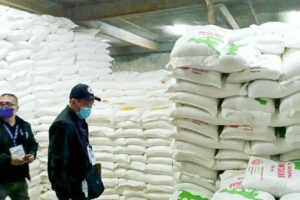AN OPPOSITION Senator said those involved in importing 260 20-foot containers of sugar through the port of Batangas could have committed economic sabotage, after the shipments bypassed the regular import process authorized by a formal sugar order.
Senator Ana Theresia N. Hontiveros-Baraquel in a statement on Thursday described the three companies involved in the Batangas shipments as “handpicked” by government officials, and alleged that their activities constituted cartel-like behavior.
“How can this be anything but government-sponsored smuggling?” she added.
Ms. Hontiveros said the size of the shipment could be considered “large-scale agricultural smuggling.”
Republic Act 10845, which classifies large-scale smuggling of agricultural products as economic sabotage, allows no bail for the smuggling of produce in their raw state as well as the smuggling of items that have undergone simple processing or preservation.
The no-bail rule applies to shipments valued at P1 million for most farm items. For rice the threshold is P10 million.
“Our laws, specifically the Anti-Agricultural Smuggling Act, penalize the entry of sugar valued no lower than P1,000,000 into the country without valid permits,” Ms. Hontiveros said.
“So, when Department of Agriculture (DA) Senior Undersecretary Domingo F. Panganiban yesterday admitted freely that… the three companies (were given the go-ahead) to import sugar, we hope that they are ready to face serious criminal and administrative charges,” she added.
The arrival of the shipment in Batangas on Feb. 9 came on the strength of a memorandum issued by the Office of the Executive Secretary, Mr. Panganiban said on Wednesday, preceding the issuance of a formal sugar order by the industry regulator by several days.
“In response to the directive of the President to address inflation and create a buffer stock and given that sugar is one of the components of most of commodities that drives the consistently high inflation rate, I acted with haste and interpreted the memorandum issued by the Office of the Executive Secretary as an approval to proceed with the imports,” he said.
Sugar imports typically need to be cleared by the Sugar Regulatory Administration (SRA). In this case, the SRA issued Sugar Order No. 6 authorizing imports of 440,000 metric tons of the commodity, part of which was to help form a buffer stock to stabilize prices.
“Seven months since the sugar import fiasco was first exposed, do we have another fiasco here? Who are the masterminds again responsible? What or who were the reasons as to why the Usec. was compelled to make such hasty decisions?” Ms. Hontiveros said.
Agriculture and sugar officials last year resigned following the recall of Sugar Order No. 4, signed after a meeting with the President had convinced them of an urgent need to import 300,000 metric tons of sugar, believing as well that they were fully authorized to act.
“Once and for all, for the peace of mind and wallets of our consumers, I urge the President to lead the signing of an above-board sugar order akin to past sugar orders authorizing multiple importers to import sugar,” Ms. Hontiveros said.
Sugar Order No. 6 took effect on Feb. 18, and the authorities said on Wednesday that they were still taking applications from importers seeking to bring in sugar until the Thursday deadline.
“The directive of the executive secretary to me was a manifestation that that directive is already a sugar order,” Mr. Panganiban said.
As a result, he said he instructed three companies that were “capable” and “accredited” to proceed with the sugar imports “provided that they agree to reduce the prices (to a level) that is commercially acceptable… and that they will shoulder the cost of warehousing.”
The Senator added that “if the cartels are allowed to thrive and profit, this will only result in more kickbacks, shady deals and corruption. Sugar prices will not go down,” she added. — Alyssa Nicole O. Tan
